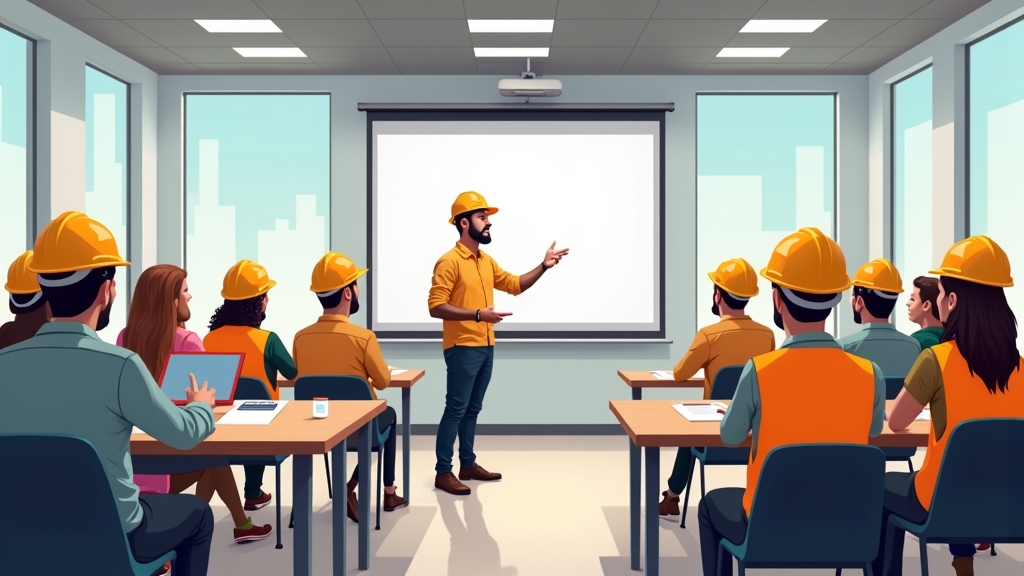In the field of construction, the figure of the master builder is crucial to the success of any project. This professional is responsible for supervising, coordinating and guiding the activities of the construction site, ensuring that everything is carried out according to quality, safety and efficiency standards.
In this article, we'll explore everything you need to know about master builder courses, from their responsibilities, to the requirements, to how to choose the ideal course and career opportunities.
The Role of the Master Builder in Construction
The master builder plays a fundamental role on the construction site. They act as a link between the work team and the engineer or architect responsible for the project. Their responsibilities include interpreting plans, coordinating work teams, supervising the execution of activities and controlling materials and equipment. In addition, the master builder must ensure that safety regulations are strictly adhered to.
To carry out these duties, the master builder needs to have comprehensive knowledge in a number of areas, such as project reading, construction techniques, people management and work safety. They must be able to make quick and effective decisions to solve any problems that may arise during the execution of the work. This expertise is acquired through both practical experience and theoretical training offered by specialized courses.
Requirements and Qualifications to Become a Master Builder
To become a master builder, you need to meet certain requirements and qualifications. In general, the candidate is expected to have at least completed elementary school. However, many employers prefer candidates with a high school education or even technical courses in the construction industry.
In addition to education, practical experience is highly valued. Many building masters start their careers as helpers or bricklayers and, over time, acquire the knowledge and experience needed to take on leadership roles. Specialized courses for building masters are also an excellent way to acquire the necessary qualifications, offering a solid foundation in construction techniques, construction management and safety.
A good master builder must have interpersonal and communication skills, as they have to deal with different profiles of people on a daily basis. Organizational skills and a sense of responsibility are also essential to ensure that the project is completed on time and within budget.
How to Choose the Ideal Master Builder Course
With so many course options available, choosing the ideal course to become a master builder can be a challenge. The first step is to check whether the course is recognized by the relevant bodies and whether it offers a certificate that is valid in the job market. Courses offered by renowned institutions or in partnership with companies in the sector are usually more credible.
Another important aspect is the course's syllabus. Ideally, it should cover both the theoretical knowledge and the practical skills needed for the job. Topics such as project reading, construction planning and control, team management and work safety should be included in the curriculum. In addition, it is interesting that the course offers technical visits or supervised internships, allowing the student to experience the reality of the construction site.
The format of the course should also be considered. There are face-to-face, semi-presential and online options. The choice will depend on your profile and time availability. In any case, it's important to check the reputation of the teachers and the infrastructure offered by the educational institution.
Benefits of Taking a Master Builder Course
Undertaking a master builder course has several benefits for those wishing to pursue a career in construction. Firstly, it provides the theoretical knowledge needed to understand all the stages of a construction project and the best practices in the sector. This provides a solid foundation for developing a successful career.
In addition, specialized courses offer the opportunity to learn from experienced professionals, who can share valuable insights and practical tips based on their experiences in the field. Networking with colleagues and teachers is also a plus, allowing you to exchange experiences and form important contacts for the future.
Another benefit is increased employability and career growth opportunities. With a master builder course on their CV, professionals become more competitive in the job market and are able to gain positions of greater responsibility and better salaries. In addition, continuous training allows the master builder to keep up to date with new trends and technologies in the sector.
Challenges and Opportunities in the Career of a Master Builder
The career of a master builder, although rewarding, presents its challenges. Dealing with tight deadlines, managing diverse teams and solving unforeseen problems are just some of the situations these professionals face on a daily basis. The need to always pay attention to details and ensure that everything goes according to plan can be stressful.
On the other hand, the career of master builder offers countless opportunities. Construction is one of the fastest growing sectors in Brazil, constantly opening up new vacancies for qualified professionals. The skills acquired by a master builder are also transferable to other areas, such as project management and civil engineering, allowing for different paths of professional development.
Those looking to become entrepreneurs can also work as consultants or open their own construction companies, drawing on the experience and knowledge they have acquired along the way. So, despite the challenges, the career of a master builder can be extremely rewarding and full of possibilities.
Trends and Innovations in the Training of Master Builders
The construction industry is constantly evolving, and the training of master builders could not be any different. New technologies and construction methods are being incorporated into courses, preparing students for the challenges of the future. One of the trends is the use of digital tools for construction planning and management, such as building information modeling (BIM) software.

Another innovation is the inclusion of topics related to sustainability and green construction in curricula. With the growing demand for sustainable buildings, it is essential that building masters are prepared to implement practices that reduce the environmental impact of construction.
Distance learning is also gaining ground in the training of building masters. Online and hybrid courses offer flexibility for students, allowing them to combine their studies with their professional activities. This type of teaching also facilitates access to up-to-date content and teachers from different regions of the country.
Conclusion
The master builder course is a valuable investment for anyone wishing to pursue a career in construction. It provides the necessary training to work competently and safely on the building site, opening doors to a successful career path. When choosing a course, it is important to consider the reputation of the institution, the syllabus and the practical opportunities offered.
With the knowledge and skills acquired, the master builder is prepared to face the challenges and take advantage of the opportunities in the sector. In addition, continuous training and keeping abreast of market trends are essential to staying competitive and up-to-date.
Frequently Asked Questions (FAQ)
What does a master builder do?
A master builder supervises the execution of construction projects, coordinating the work team and ensuring that quality and safety standards are met.
What are the requirements to become a master builder?
You must have at least completed elementary school and practical experience in the field. Specialized courses are recommended to acquire theoretical and practical knowledge.
How much does a master builder earn?
The salary of a master builder varies according to experience, location and the size of the company, but is generally above the average for the construction sector.
What is the difference between a master builder and a civil engineer?
The master builder coordinates the execution of the work on site, while the civil engineer is responsible for the design and technical and structural aspects of the project.
Is it possible to take a master builder course online?
Yes, there are online and hybrid courses that offer flexibility to students, allowing them to study at their own pace.
What does a master builder course teach?
The course teaches project reading, construction techniques, team management, safety at work, among other things.
How long does a master builder course last?
The duration varies, but generally the courses are between 100 and 300 hours.
Are there any free master builder courses?
Yes, some institutions offer free or subsidized courses, especially in government professional qualification programs.
How to choose a good master builder course?
Check the recognition of the course, the syllabus and the reputation of the institution. Choose courses that offer supervised practice and networking.
What are the career opportunities for a master builder?
As well as working on construction sites, the master builder can work as a consultant, start his own company or move on to more senior positions, such as project manager.
What skills are important for a master builder?
Interpersonal skills, communication, organization, leadership and technical knowledge are essential for a master builder.
Can I take a master builder course without any experience in the construction industry?
It is possible, but having practical experience is an important differentiator to better understand the context of the course and increase employability.
What is BIM and why is it important for a master builder?
BIM is a building information modeling technology that helps plan and manage projects. Its importance is growing as the sector adopts digital methods.
How is sustainability being incorporated into master builder courses?
Courses are including sustainable practices and green construction in the curriculum, preparing students to meet the demand for environmentally friendly buildings.
What is the future of the profession of master builder?
With the continuous growth of the construction industry and the adoption of new technologies, the future is promising, offering many opportunities for advancement and specialization.



